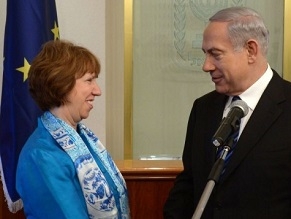|
World Jewish News

Prime Minister Benjamin Netanyahu with EU Foreign Policy Chief Catherine Ashton, during their meeting in Jerusalem, on June 20, 2013. (photo credit: Amos Ben Gershom/ GPO/Flash90)
|
Israel moves to quit flagship EU project over restrictions
18.07.2013, Israel Israel has threatened to pull out of the European Union’s flagship innovation project unless the EU backs down from its funding ban on Israeli institutions operating over the pre-1967 lines.
Israel is a major contributor to the EU’s €80 billion Horizon 2020 project, which aims to create new growth and jobs in Europe by the end of the decade. According to Hebrew daily Maariv, Israel is meant to contribute upwards of €600 million to the project over the next seven years, while receiving even larger sums in research grants.
The EU’s new directive, made public Tuesday, contains two main elements: denial of European funding to, and cooperation with, Israeli institutions based or operating over the Green Line, and a requirement that all future agreements between Israel and the EU include a clause in which Israel accepts the European Union’s position that all territory over the Green Line does not belong to Israel.
The restrictions are ostensibly meant to help Israel, by ensuring that it remains a recipient of EU funds, provided that the money doesn’t cross the Green Line, the EU has said. But they also serve to alienate Israel, which sees the restrictions as a back-handed way of predetermining its future borders.
“This is important in view of the new opportunities that will be offered to Israel (as an ENP [European Neighborhood Policy] partner) for participation in EU programmes and other funding instruments in the 2014-2020 financial framework,” read an EU statement issued to The Times of Israel.
“The Europeans have a right to do whatever they like with their money. However, their directives also influence what Israeli institutions do with funds that do not come from the EU, and that is unacceptable,” a senior Jerusalem official told Maariv.
Israel is poised to play a central role in the Horizon 2020 project and though it also stands to benefit from it, pulling out of the joint venture will strike a blow to the EU because of Israel’s standing as a research center. Israel’s special status is evident in the fact that it is the only non-EU member state to be granted full partnership in the project.
According to the official, the Israeli government has decided that the financial losses caused by pulling out of the project cannot justify giving in to the EU’s sanctions. “The EU must determine whether it is worth it to lose out on Israel’s human resources,” he said.
Meanwhile Foreign Ministry sources cautioned that quitting Horizon 2020 would deliver a costly blow to Israel’s hi-tech sector.
“For every Euro we put into the project, we will receive a Euro and a half back in investment in research. We should think long and hard about whether this move isn’t too far-reaching,” said one diplomat.
On Wednesday, Prime Minister Benjamin Netanyahu spoke with a series of European leaders, outlining his strong objections to the new directives. Netanyahu discussed the measure with the President of the European Commission Jose Manuel Barroso, as well as the leaders of France, Greece, Malta, and Austria, in an effort to delay the ban’s enforcement. Netanyahu also reportedly spoke about the measures with US Secretary of State John Kerry, who is in the region to promote Israeli-Palestinian peace talks.
Israel’s chief peace negotiator, Justice Minister Tzipi Livni, met Wednesday with the European Union envoy for Mideast peace, Andreas Reinicke, and told him that postponing the ban’s enforcement would help relaunch peace talks, which stalled nearly five years ago.
The Times of Israel
|
|
